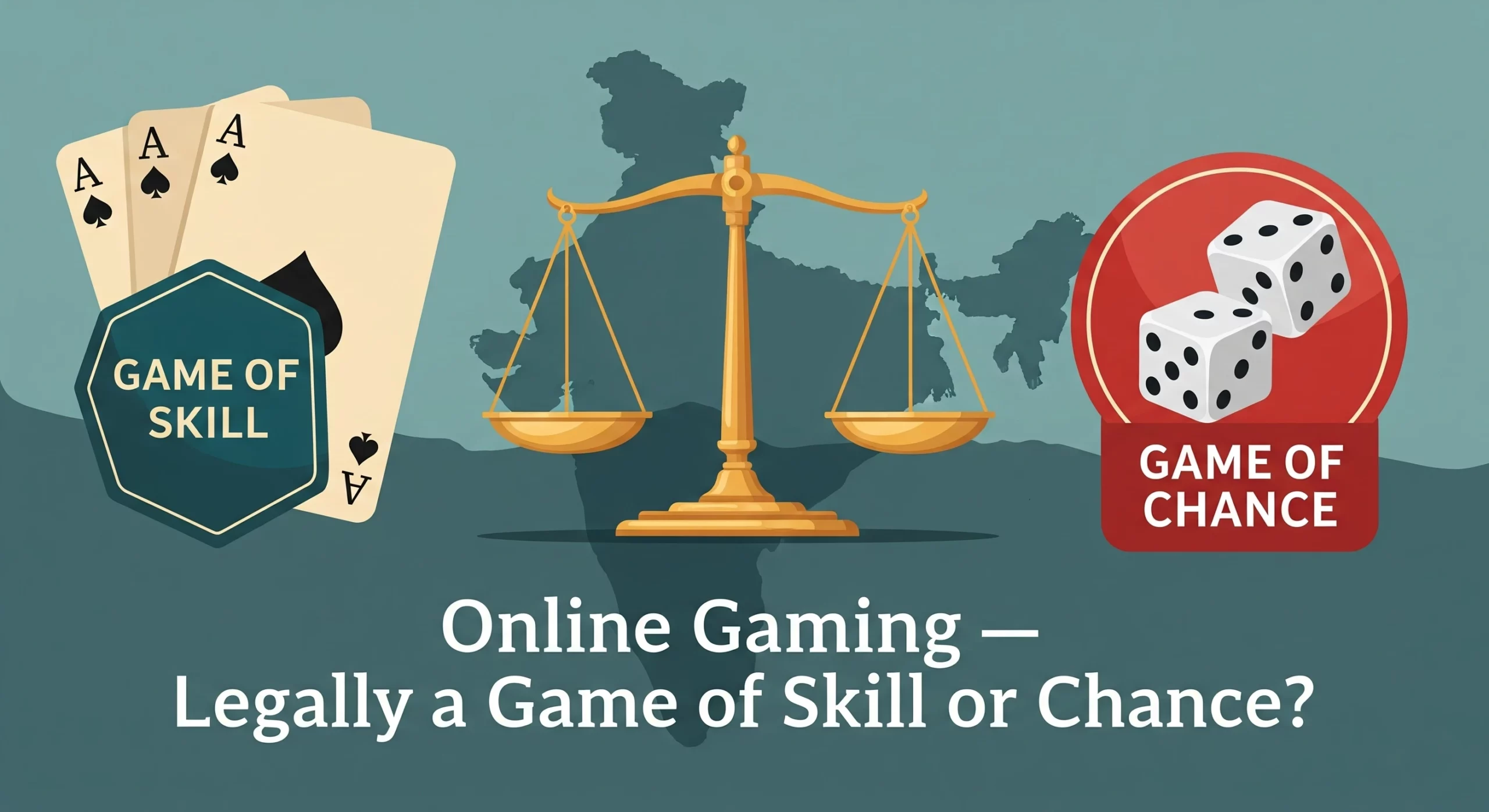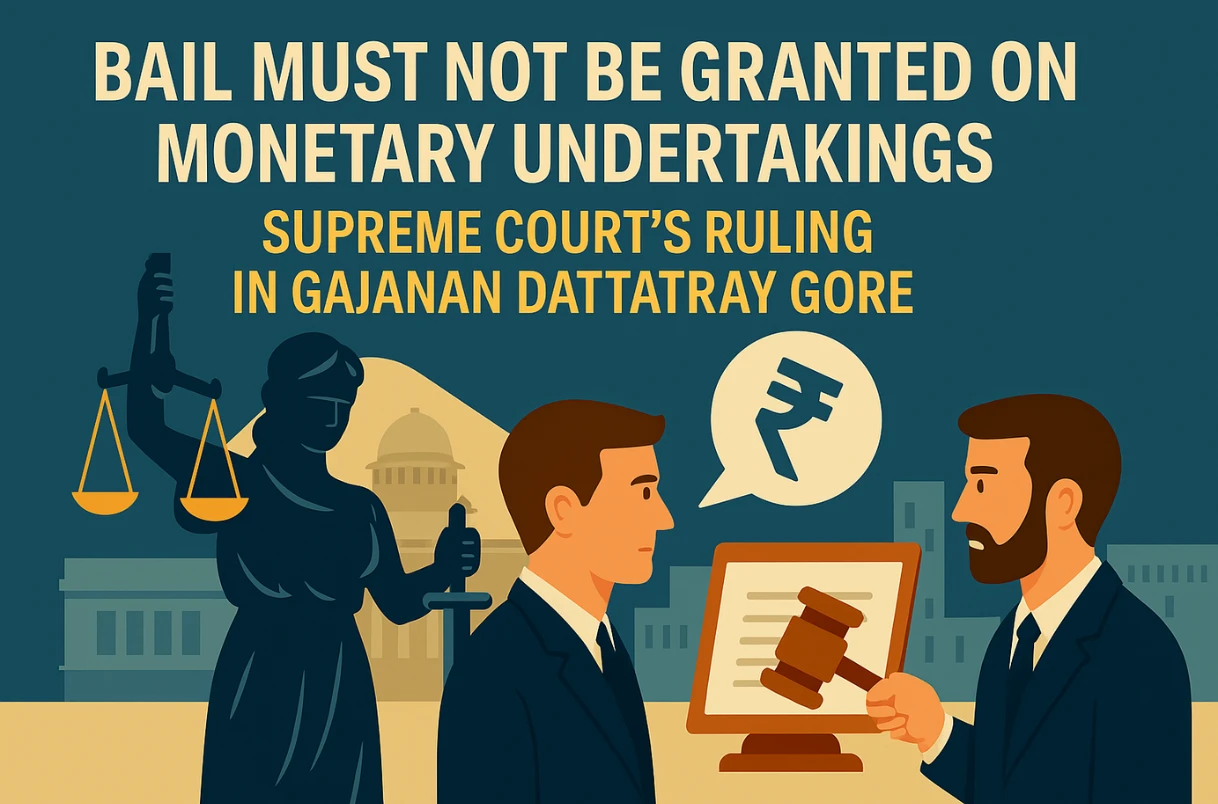Online Gaming: Navigating the Game of Skill v. Game of Chance Conundrum

By – Neha Das and Aditya Pratap Singh
Table of Contents
Introduction
The online gaming industry in India has witnessed an unprecedented rise, attracting huge capital investments from both domestic and international investors. With increasing availability of smartphones, affordable data, and rising consumer engagement, online poker, rummy, fantasy sports, and e-sports have witnessed exponential growth, especially where the stakes and financial risks are very high. Yet, the legal framework governing gaming remains fragmented, outdated, and often inconsistent. The critical legal issue continues to be whether a particular game constitutes a “game of skill” or a “game of chance,” because the distinction determines whether it falls within gambling prohibitions under state law.
This article examines (i) the legal test for distinguishing skill-based from chance-based gaming, (ii) state and central regulatory interventions, (iii) judicial developments, and (iv) key commercial and compliance considerations.
I. Game of Skill vs. Game of Chance: Judicial Interpretation in India
Early Judicial Precedents on Skill-Based Games
Indian jurisprudence has historically treated games in which skill predominates over chance as distinct from gambling. In R.M.D. Chamarbaugwala v. Union of India1, the Supreme Court recognised that competitions which involve the element of ‘skill’ fall outside the ambit of gambling prohibitions. It held that competitions where success substantially depends on skill and those where it does not are two distinct and separate categories. The distinction between the two types of competitions is as clear-cut as the difference between commercial and wagering contracts. While it may sometimes be difficult to decide, based on the facts, which category a particular competition belongs to, once its true character is determined, it must fall squarely into one category or the other.
Further, the Supreme Court, while deciding whether Rummy is a game of chance or a game of skill, held that it is predominantly and primarily a game of skill. In State of Andhra Pradesh v. K. Satyanarayana2, it held that the game of rummy is not entirely a game of chance like the “three-card” game, known by various names such as “flush” or “brag,” which are games of pure chance. Rummy requires a certain level of skill, as players must memorize the fall of the cards and strategically build sequences, which involves considerable skill in holding and discarding cards. It further observed that the element of chance in Rummy is similar to that in a game of bridge. Indeed, in all card games where the cards are shuffled and dealt, an element of chance is inevitable, as the distribution of cards is not based on any fixed pattern but depends entirely on the random outcome of the shuffle.
Similarly, in Dr. K.R. Lakshmanan v. State of Tamil Nadu3, the Supreme Court interpreted ‘gaming’ in light of the law laid down by the Apex Court in the Chamarbaugwala cases4. While deciding that betting on horse racing was a game of skill rather than chance. It clarified that “gaming” refers to the act or practice of gambling on a game of chance, where chance is the controlling factor. However, wagering or betting on horse racing, which is recognized as a game of skill, does not fall within the scope of gambling.
Evolving Judicial Views on Online Gaming
Recent jurisprudence has extended this reasoning to online platforms as well. The Madras High Court in Junglee Games India Pvt. Ltd. v. State of Tamil Nadu5 invalidated the Tamil Nadu Gaming and Police Laws (Amendment) Act, 2021, which sought to ban online rummy and poker, holding that the state had failed to justify a blanket prohibition on skill-based games and that such a prohibition violated Articles 19(1)(g) and 14 of the Constitution.
It further distinguished between games and activities in the physical form and games conducted in virtual mode or cyberspace. However, when it comes to card games or board games such as chess or scrabble, there is no distinction between the skill involved in the physical form of the activity or in the virtual form. It also equated Rummy and Poker to be both games of skills, especially considering that the Law Commission in its 276th Report had also approved of Poker as a game of skill.
Similarly, in M/S DM Gaming v. State of UP6, a case involving online poker and rummy platforms, the Allahabad High Court reaffirmed that games requiring substantial skill cannot be equated with gambling merely because they are played online. The Court observed that equating skill games with gambling without empirical basis could stifle digital innovation and violate constitutional freedoms. It recommended that governments adopt evidence-driven approaches before imposing restrictions.
Recognition of Fantasy Sports as Games of Skill
Fantasy sports platforms like Dream 11 have also come under judicial scrutiny. The Punjab & Haryana High Court analysed the format of Dream 11 in Varun Gumber v. Union Territory of Chandigarh7 and held that Dream 11 constitutes a game of skill, since success on its platform depends primarily on the knowledge of players, research on statistics, and the ability to make informed choices rather than on luck.
This matter was also taken up in appeal, however the Supreme Court dismissed appeals against this decision, affirming the application of the skill-versus-chance test to fantasy sports8.
Further, a division bench of the Bombay High Court in Gurdeep Singh Sachar v. Union of India9 was considering in PIL jurisdiction as to whether playing of fantasy games by virtual teams amounted to gambling, it answered the question in the negative specifically recording a finding that the success in dream 11 fantasy sports depends upon users exercise of skill based on superior knowledge, judgment and attention, and that the result of the game was not dependent on the winning or losing of the particular team in the real world game on any particular day. The Court said “It is undoubtedly a game of skill and not a game of chance.” The matter was carried upward to the Apex Court in SLP (Criminal) No. 43346/2019 which came to be dismissed on 13.12.2019.
Judicial Perspective on E-Sports and New-Age Gaming
In addition to the above, E-Sports have grown rapidly in India, attracting a large number of players and viewers. However, they continue to face regulatory concerns such as youth addiction and the nature of game content. Temporary bans on games like PUBG and public interest litigations highlight the ongoing debate between fostering innovation in gaming and ensuring adequate safeguards.
Scope of State Regulation Clarified by Courts
The Madras High Court in All India Gaming Federation v. State of Tamil Nadu10, has held that the State has got authority to legislate on online games of chance, it however, expressly clarified that rummy and poker, even though online are games of skill and cannot be banned as gambling. It struck down their inclusion in the Schedule of banned games, read down the law to apply only to games of chance, and affirmed that the State has the power to regulate online skill games through measures such as age restrictions, time limits, and other reasonable safeguards.
These developments show how courts are extending the same principles used in earlier skill-based game cases to newer formats such as online gaming, fantasy sports and eSports.
II. Legal Framework Governing Online Gaming in India
A. Constitutional Division of Powers
The first legislation on gaming in India was introduced through the Public Gaming Act, 1867 (“PGA”), a colonial-era statute enacted to provide for the punishment of public gambling and the operation of gaming houses. According to this Act, all forms of gambling and betting activities, except for horse racing are illegal. Moreover, PGA only deals with physical betting and is silent on the online betting. This Act continues to remain in force even after independence, having been preserved under Article 372 of the Constitution of India.
Further, the State is empowered to legislate in respect of the Entries in State List of the Constitution of India. Entry 34 of the List II (State List) includes betting and gambling. Therefore, the State legislature has exclusive jurisdiction to enact laws pertaining to betting and gambling.
However, in the absence of State-specific regulations, the PGA continues to apply. Some States have introduced amendments to the PGA to suit their specific requirements. Gambling is generally prohibited across all States, except in Sikkim, Goa, and Daman.
Notably, Section 12 of the Act (PGA) provides that any game in which skill is the predominant factor shall not be considered gambling, whereas games of chance fall within the definition of gambling.
B. Central Oversight Through IT Rules and Self-Regulation
Although gaming is a State subject, the Central Government has asserted its jurisdiction through regulatory measures. The Ministry of Electronics and Information Technology (MeitY) introduced the Information Technology (Intermediary Guidelines and Digital Media Ethics Code) Amendment Rules, 2023, which formally recognized the term online gaming intermediary and placed it at par with significant social media intermediaries.
Under Rule 4A of the IT Amendment Rules, 2023, the Ministry may, by a notification in the Official Gazette, designate as many Online Gaming Self-Regulatory Bodies as it may consider necessary for the purpose of verifying an online real money game under the Rules. Through this, the Central Government has sought not only to usurp power for itself, but also to outsource it to a Non-Governmental Body for the State’s exclusive competence to legislate on “betting and gambling” under Entry 34 in the State List.
Consequently, online gaming intermediaries are subject to stringent compliance requirements, including grievance redressal mechanisms, user verification, and proactive monitoring of unlawful content.
III. State-Level Approaches to Regulating Online Gaming
A. Nagaland
The Nagaland Prohibition of Gambling and Promotion and Regulation of Online Games of Skill Act, 2015 expressly recognises online games of skill (e.g., poker, rummy, fantasy sports, chess, quizzes) and provides a licensing mechanism to entities incorporated in India and stipulates that the technology support provision including hosting and management of website, placement of servers etc. shall remain in India11.
B. Sikkim
The Sikkim Online Gaming (Regulation) Act, 2008 was enacted to provide for the control and regulation of online gaming through electronic or non-electronic formats, and to impose tax on such games, in the State of Sikkim12. It clarifies that online games mean all or any games of chance or a combination of skill and chance, including but not limited to Poker, Roulette, blackjack or any game, played with cards, dice or by means of any machine or instrument for money or money’s worth. Thus, it permits online gaming for certain casino-style games (roulette, blackjack, poker, etc.). Access, however, is geographically restricted within the state’s boundaries.
C. Restrictive States
States such as Telangana have removed traditional skill-based game exemptions from their statutes, effectively prohibiting all forms of gaming for stakes13. Assam14 and Odisha15 adopt similar blanket prohibitions on all forms of gaming. These restrictive approaches contrast sharply with states like Sikkim and Goa, which have opted for a more regulated framework.
Conclusion: Towards a Unified and Balanced Gaming Law
India’s online gaming industry is growing at an unprecedent pace, however, it faces legal and regulatory uncertainty. Courts have protected skill-based games like rummy, poker and fantasy sports, recognising them as legitimate business activities rather than gambling.
However, state laws remain fragmented, while some states regulate and license online gaming, others impose blanket prohibitions. As technology continues to transform gaming, India needs clear and balanced regulations that foster innovation while ensuring responsible gaming and player protection. A uniform, evidence-based framework would enable industry growth while effectively addressing social concerns.
FAQs
-
What is the legal status of online gaming in India?
The legal status of online gaming in India varies across states. While some states like Nagaland and Sikkim regulate and license certain online games, others such as Telangana and Assam have imposed blanket bans. The key distinction lies in whether a game is classified as one of skill (which is generally legal) or chance (which is typically treated as gambling and prohibited).
-
How does Indian law distinguish between games of skill and chance?
Indian courts have consistently held that games where success depends primarily on the player’s skill – such as strategy, knowledge, or judgment- are not considered gambling. On the other hand, games where outcomes are predominantly determined by chance fall under the category of gambling and can be legally restricted or banned by states.
-
Is online poker legal in India?
Judicial decisions, including those by the Madras and Allahabad High Courts, have recognized poker as a game requiring substantial skill. However, legality still depends on the state – while some permit poker under licensing frameworks, others like Telangana, Assam, and Odisha prohibit it entirely under their anti-gambling laws.
-
Are fantasy sports considered gambling in India?
No. Multiple High Courts (including Punjab & Haryana and Bombay) have ruled that fantasy sports platforms like Dream11 involve significant skill, such as player analysis and strategic team formation. As a result, they are treated as games of skill and not gambling. The Supreme Court has upheld these findings by dismissing appeals against such rulings.
-
Can I legally play rummy online in India?
Yes, rummy has been recognized by the Supreme Court as a game of skill. However, whether you can legally play it online depends on your state’s laws. States that have banned all forms of gaming for stakes (like Andhra Pradesh or Telangana) do not allow even skill-based games like rummy.
-
How do states regulate online gaming differently in India?
Gaming is a state subject under the Constitution, which means each state has the authority to legislate on it. States like Nagaland and Sikkim have introduced licensing regimes for skill-based online games. In contrast, states like Telangana, Odisha, and Assam have enacted laws that prohibit all forms of online gaming involving stakes – regardless of whether they involve skill or chance.
-
Do players need to verify their identity to play legal online games in India?
Yes. Under the Information Technology (Intermediary Guidelines and Digital Media Ethics Code) Rules, 2023, online gaming platforms classified as “online gaming intermediaries” must implement user verification mechanisms. This typically includes KYC (Know Your Customer) checks to ensure compliance with age restrictions and financial regulations.
-
Are winnings from online gaming taxable in India?
Yes. Winnings from online games involving real money are subject to taxation under the Income Tax Act, 1961. As of April 1, 2023, a flat 30% tax is applicable on net winnings from online gaming platforms, as per Section 194BA. Platforms are required to deduct this amount at source (TDS).
-
Is it safe to use real money in online gaming apps in India?
It is generally safe to use real money on licensed and regulated platforms, especially those compliant with IT Rules and taxation laws. However, using unregulated or banned platforms carries risks such as fraud, lack of dispute resolution, and possible legal consequences.
-
Can minors legally participate in online gaming in India?
Minors are prohibited from participating in real-money gaming under Indian law and platform policies. Many compliant platforms restrict access through age verification, in line with child protection standards and IT Rules, 2023. Skill-based casual games without monetary stakes may still be accessible depending on platform policy.
-
What are the consequences of playing on banned gaming platforms in India?
Playing on banned platforms can result in legal penalties under state-specific gambling laws, especially in jurisdictions like Telangana or Assam where all forms of gaming for stakes are prohibited. Additionally, users risk financial loss, data breaches, and no legal recourse in case of fraud or platform shutdown.
References –
- 1957 SCC Online SC 11
- 1967 SCC Online SC 333
- (1996) 2 SCC 226
- Supra
- 2021 SCC OnLine Mad 2762
- Order dated 29.08.2024 passed by Allahabad High Court in Writ Petition (C) No. 3880 of 2024.
- 2017 SCC OnLine P&H 5372
- 2017 SCC OnLine SC 2170
- 2019 SCC OnLine Bom 13059
- 2023 SCC OnLine Mad 6973
- Nagaland Prohibition of Gambling and promotion and Regulation of Online Games of Skill Act, 2015.
- Sikkim Online Gaming (Regulation) Act, 2008.
- Telangana Gaming Act, 1974 and Telangana Gaming (Amendment) Act, 2017
- Assam Gaming and Betting Act, 1970
- The Odisha Prevention of Gambling Act, 1955


